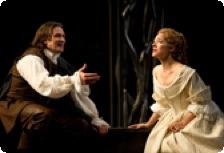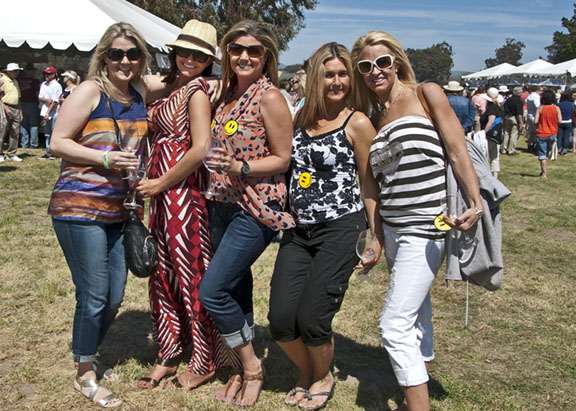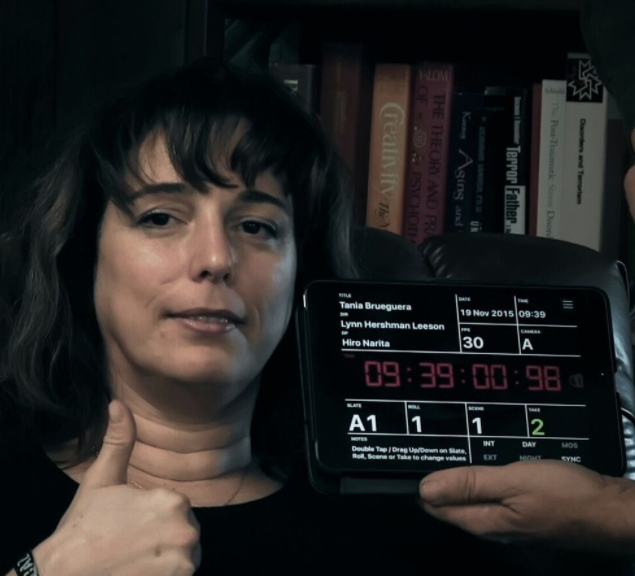by Evan Karp
When the lights go dim and a cello announces the middle of the dire conflict that begins Phedre, audiences at The American Conservatory Theater will be transported into an unknown time period. But they will feel far from lost.
Adapted by A.C.T.’s Artistic Director Carey Perloff as part of Stratford Shakespeare Festival’s 2009 Season, this world premiere production of the French classic – Voltaire called it “the masterpiece of the human mind” – is a rare opportunity to experience the evolution of theater through multiple cultures.
The characters, though dressed in garments of the 17th century French high court, believe in Greco-Roman gods and abide by laws established in accordance with mythology. Timberlake Wertenbaker’s poetic translation is spoken in dramatically modern language, and the score was written by experimental and Pulitzer Prize-winning American composer David Lang.
This wide-ranging amalgam of inspiration led Stratford star and title role-bearer Seana McKenna to pose a very valid question during preliminaries: “Where are we?”
But those who attend Phedre at The American Conservatory Theater will find the cast has not only answered this question; they’ve re-imagined it. As Claire Lautier, who plays Aricie, said: “It’s not that often you get to reexamine a piece a few months after a run, and in a radically different setting. During the summer, it felt like we barely scratched the surface; by the time I began to feel grounded, the run was over.”
The acclaimed Canadian troupe is making their first appearance in the Bay Area after having performed (also under Perloff’s guidance) in Toronto. There they used a runway-style stage surrounded by the audience, whereas here they have recreated the set for A.C.T.’s proscenium – or picture-box style. As a result, the cast has been able to revisit a work that is both familiar and fresh in their minds.
Originally written by Euripides, Phedre (then Hippolytus) was modified and much-improved by Racine, who sharpened the play’s focus into a more apt commentary of the human disposition by making the characters less extreme and more empathetic.
The play unfolds according to the desperate love of Phedre for her son-in-law Hippolytus—a man she has for years treated with open hatred to hide her true feelings. Husband and King of Athens Theseus has been away for half a year when his death is reported. Phedre confesses her love to Hippolytus, who spurns her, and shortly thereafter Theseus returns … very much alive.
Like any traditional Greco-Roman characters, these are laced with blindness and an inability to control their passions. There are moments when this stubborn refusal to see the truth – despite direct warnings from other characters – is unbelievable and a bit frustrating. Ironically (but perhaps appropriately), more than one character shares McKenna’s initial question: “Where are we? What have I spoken?” And, almost verbatim: ‘What is my motivation here?’ (“What am I doing? Where is my reason? For who? For what?”)
Much of the play depends on this fragile balance between speaking one’s mind and obeying one’s duties, and the rigid leitmotifs of language here preserve the currents of passion the characters strive to control. As they struggle to do the right thing – and, to boil this down to a single phrase, this means controlling one’s passions – we are shown (with artful spotlighting) a dilemma that reveals the very core of human morality.
As Wertenbaker says, “French tragedy makes you look at the human being. You look at a character like Phedre and you feel sorry for her, and you might be horrified by her, but you’re not necessarily in tears at the end. … [The characters] are full of passion, but it’s a passion that is always restrained, and I think the audience is meant to leave the theater in wonder and horror or astonishment—but not feeling that they’ve been taken through an emotional wringer.”
In the end, a messenger informs Theseus that Hippolytus has died; it is this concurrence of speech and duty that appropriately takes the crowd’s collective breath. He has “done his fateful duty.” Now the amazing hush and stillness overtakes the crowd. Now the audience becomes as one, absorbed by the drama and affected by its results and their implications. I noticed that instinct brought the lovers in front of me a little bit closer though they did not touch … fingers tangling in hair became fingers entangled in hair, suspended in time.
The set, designed by Christina Poddubiuk, consists of giant column-like structures extending to the ceiling that resemble the intertwining of vines or bundles of nerves, while the backdrop is comprised of what appear to be large ceramic tiles that depict a forest-like tapestry. The tiles interact with the columns in a way that allows the forest and the court, passion and reason, to exist simultaneously. In fact, the columns appear to be segments of the forest isolated within very defined boundaries; the vines are forced to twist and intertwine if they are to grow.
As always, A.C.T. has special performances and events related to the play, including audience exchanges with Lang and UC Berkeley Professor Timothy Hampton and, one of my favorites: Bike to the Theater Night.
Photos by Erik Tomasson
WHO: by Jean Racine
Translated and adapted by Timberlake Wertenbaker
Directed by Carey Perloff
Presented in association with the Stratford Shakespeare Festival, Ontario, Canada
Designed by James F. Ingalls (lighting designer), David Lang (original music), and Christina
Poddubiuk (scenic and costume designer)
Featuring Sean Arbuckle (Théramène), Jonathan Goad (Hippolytus), Sophia Holman (Panope),
Claire Lautier (Aricie), Mairin Lee (Ismène), Roberta Maxwell (Oenone), Thomas McCamus
(Theseus), and Seana McKenna (Phèdre)
WHERE: American Conservatory Theater
415 Geary Street, San Francisco, CA 94108
WHEN: January 15–February 7, 2010
Tue.–Sat. at 8 p.m. (1/26 performance at 7 p.m.)
Wed., Sat. & Sun. at 2 p.m.
Additional performances: 1/24 (7 p.m.)
InterACT Events:
Postperformance Audience Exchanges…..1/26 (7 p.m.), 1/31 (2 p.m.), 2/3 (2 p.m.)
OUT with A.C.T………………………………………….1/27 (8 p.m.)
Bike to the Theater Night…………………………1/28 (8 p.m.)
HOW MUCH: $10–$82
Premiere | Orchestra | Dress Circle | Balcony | 2nd Balcony
Weekend: $82 | $67 | $57 | $41 | $22
Weekdays: $71 | $57 | $47 | $34 | $17
Weekdays: ($17–$71): Tues. 7 p.m., Tues.–Thu 8 p.m., Fri. 8 p.m., Sun. 7 p.m., Wed. 2 p.m.
Weekend: ($22–$82): Sat. 8 p.m., Sat. & Sun. 2 p.m.
TIX & INFO: 415.749.2228 | Order Online









